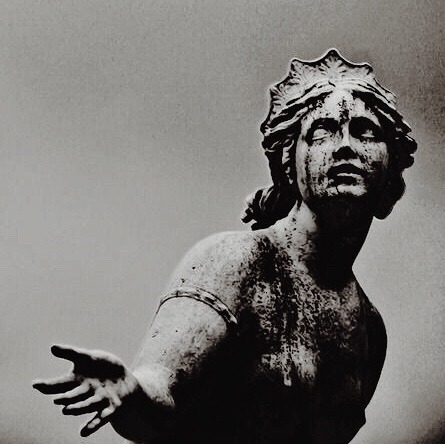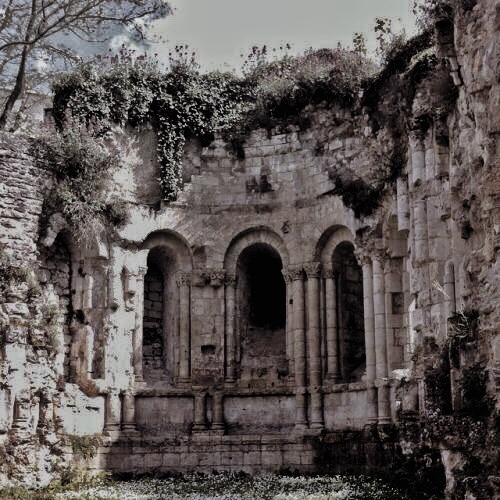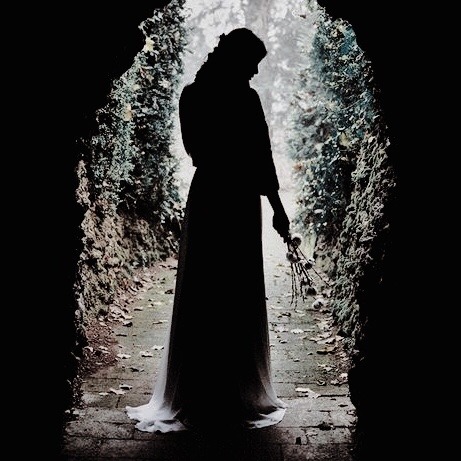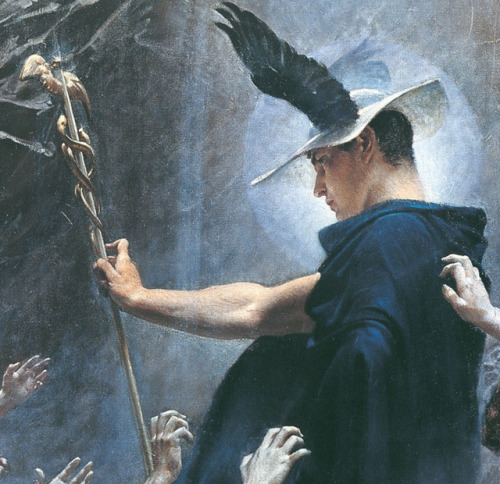"I Love You" - An Analysis Of Zeus's Relationship To Hera, And All It's Complexities
"I Love You" - An Analysis Of Zeus's Relationship To Hera, And All It's Complexities
Requested by @sworebytheriverstyx to expand on what I meant in this post, so I decided to write upon it! Also @withlovefromolympus bc I can <3
Enjoy!
So in the post mentioned above, I stated that in every interaction Zeus has with his wife, Hera, he would end it with an "I love you", but with time, the meaning/connotation/perception has changed (and maybe connotation wasn't the right word for that post... idk, it was late and now idc *shrugs*). Now, what do I mean by that? Many things.
In the beginning, back when Zeus was trying to seduce Hera or even further into the beginnings of their actual relationship, Zeus used this phrase as a way of connection. Of flattery and of security. That no matter what, he will always love her. And he meant this phrase fully and genuinely each time, showing to her that even when his mind was always occupied, or even angered, he will always love her. He would whisper it after their small fights or during a long night of sleep deprivation and trying to rule a newly-formed kingdom. A connection, a bridge for him to give as she walked upon it and stayed close to him.
Hera loved this. She was and never will be a person of physical and shown affection, especially as public as their lives may be as King and Queen, so Zeus doing all the work for them, to keep that connection verbally while she may be too shy to do it in any other place than their bed, is really appreciated. It warms her heart to know that, no matter what, he will love her. That, no matter if their hands cannot touch each other in the way they both want them to, his words will connect them. That she can take those vibrations and wrap them in her wind, have them echo and vibrate around her as she sometimes travels far away from him. It is their connection. Their Purpose together as King and Queen.
It starts out affectionate.
Then... it turns to something else.
She catches him cheating. They fight and throw things at each other, hurtling insults and trying at their power dynamics. She turns her back on him to leave (flee) and, still, he always whispers those three words. "I love you," comes from his lips and she's fooled each time. She comes back to their chambers warm and waiting, her skin icy cold but those words always trying to warm her from her core. He says it each and every time and, suddenly, it's not intimate anymore. Her skin is too cold and they are said to often, to thrown away, to carry their warmth to her core anymore. The connotation is different now. It's like he's trying to ask for her forgiveness. That their three words will make any difference in the already-determined outcome. She forbids him from saying it in their bedroom anymore, eventually extending that ban to all of Olympus. He tries to push her, to continue saying it, but she stands her ground by leaving it. She does not care if he says it anyway. They are not them anymore.
Zeus still tries. He seeks his wife out in the dark, in places nobody could possibly see her so she could maybe open a little more up. She tries to flee and, in the beginning, he lets her, but he tightens his grip more and more as he realizes they aren't getting anywhere. To him, the words are still a sign of their Love. Mortals preach and preach about loving someone forever, that people change but if you love them enough, then they will stay with you. He's tried everything with Hera. Talking, taking her out on dates, and Tartarus! he's even attempted to stay faithful for a long time for her, just enough for her to settle down for them to have a proper Talk! But Hera wouldn't budge and the longing for a mortal's softness, for a mortal's insignificance, was too much when his bed was already becoming too cold. At first, it was a release. A curiosity and a homesickness of back when he was young, running around Gaia's Plains like he had no care. He missed those days and wanted to experience that again, to take a break from his Kingly Load and just experience mortality again. Now, it's become a coping mechanism. The thought of coming home from a long day to see his wife not talking to him and practically mountains between them made his heart ache and so he went to different beds, trying out their warmths and softness and experiences. He tells her he loves her, trying to rekindle their relationship again, but even he knows it's drifting away. That it's more of an excuse now, but it's the only thing he can seem to grasp of her now. He's trying, he swears, but they're now too broken to be fixed.
The connotations of love between Zeus and Hera, written by Altis (sleepdeprivationbutposeidon)
More Posts from Zoexqsblog and Others

Iris is an ancient goddess who provides communication between the heavens and earth … Ben Harrison art









Greek mythology from A to Z:
[A] - Ate (Ἄτη) was the goddess of mischief and ruin
Did you know that Antilochus was among Helen's suitors?
peleus: my son cannot be a suitor. he is only 6. far too young.
meanwhile nestor: [presenting helen with what can only be described as a fresh out the womb baby] a great husband, no? a real charmer.
The Secret Reading List: Books mentioned in The Secret History
If you want to be as erudite and elite as the Classics Clique, you’d better add these books to your reading pile…
Specific prose/poetry/plays mentioned:
Untimely Meditations by Friedrich Nietzsche, Epigraph Republic, Book II by Plato, Epigraph Tom Swift by Victor Appleton, 6 Paradise Lost by John Milton, 8, 91 Goodbye, Columbus by Philip Roth, 33 The New Testament, 36 Agamemnon by Aeschylus, 40 Oresteia by Aeschylus, 40 Inferno by Dante, 41, 115 Poetics by Aristotle, 41 The Iliad by Homer, 41, 627 The Bacchae by Euripides, 42, 204 Parmenides by Plato, 67 The Great Gatsby by F. Scott Fitzgerald Ivanhoe by Sir Walter Scott, 85 Rover Boys by Edward Stratemeyer, 85 Journey from Chester to London by Thomas Pennant, 85 The Club History of London by ?, 85 The Pirates of Penzance by W.S. Gilbert, 85 Bobbsey Twins by Laura Lee Hope, 85 Marino Faliero by Lord Byron, 85 The Waste Land by T.S. Eliot, 89 Sherlock Homes by Sir Arthur Conan Doyle, 92, 622 Madame Bovary by Gustave Flaubert, 94 Mémoires by Duc de Saint-Simon, 103 Vanity Fair by William Makepeace Thackeray, 110 Othello by Shakespeare, 115 The World Book Encyclopedia, 117 Men of Thought and Deed by E. Tipton Chatsford Invisible Man by H.G. Wells Peter Pan, or The Boy Who Wouldn’t Grow Up by J. M. Barrie, 180 The Divine Comedy by Dante, 184 Superman Comics, 417 The Upanishads, 441, 466 Perry Mason Novels by Erle Stanley Gardner, 442 With Rue my Heart is Laden by A.E. Housman, 466 Lycidas by John Milton, 466 The Charge of the Light Brigade by Alfred Lord Tennyson, 466 In Flanders Fields by John McCrae, 466 Corpus of Mycenaean Inscriptions from Knossos, 481 Alice in Wonderland by Lewis Carroll, 554 The Malcontent by John Marston, 615 The White Devil by John Webster, 615 The Broken Heart by John Ford, epilogue epigraph, 615 Doctor Faustus by Christopher Marlowe, 616 The Revenger’s Tragedy by Cyril Tourneur, 616 Our Mutual Friend by Charles Dickens, 619
Authors mentioned:
J.R.R. Tolkien, 6 Ezra Pound, 16 T.S. Eliot, 16 Alfred Douglas, 18 Robert de Montesquiou, 18 Plato, 22, 36 Homer, 23, 36, 49, 509 Dante, 33 Virgil, 33 Plotinus, 37 Marie Corelli, 85 Shakespeare, 91, 615 Alexander Pope, 103 John Donne, 117 Rupert Brooke, 120 Edgar Allen Poe, 132, 200 Hegel, 139 Raymond Chandler, 153 Gregory of Tours, 481 Thomas Aquinas, 509 P.G. Wodehouse, 538 George Orwell, 576-7 Harold Acton, 577 Salman Rushdie, 582 Agatha Christie, 587 Proust, 612 John Webster, 615 Thomas Middleton, 615 Cyril Tourneur, 615 John Ford, 615 Christopher Marlowe, 615 Walter Raleigh, 615 Thomas Nashe, 615
NB: page numbers correspond to the Popular Penguin Edition.

Devotional art of grand Lady Leto and Her blessed twins (inspired by Her statue)

Adolf Hirémy-Hirschl - The Souls of Acheron, 1898 (detail), oil on canvas




‘Romantic evening’-details
Delphin Enjolras
French, 1857–1945
Briseis: I spy with my little eye, something that starts with an ‘s’.
Automedon: Salt? A snake?
Automedon: Sand?
Patroclus and Achilles: [staring at each other]
Automedon: Sexual tension?
I keep thinking about the suggestion that Apollo hated Achilles so much because Achilles was literally just like him but mortal (blond, musical, good with a sword, talented at medicine) and he just didn't care for that.

Psychopomps on break 🪶
This was a colored sketch commission!
-
 antycapricorn liked this · 11 months ago
antycapricorn liked this · 11 months ago -
 zoexqsblog reblogged this · 2 years ago
zoexqsblog reblogged this · 2 years ago -
 kt4747 liked this · 2 years ago
kt4747 liked this · 2 years ago -
 theoi-crow liked this · 2 years ago
theoi-crow liked this · 2 years ago -
 superkooku liked this · 2 years ago
superkooku liked this · 2 years ago -
 nezukoo-channn liked this · 2 years ago
nezukoo-channn liked this · 2 years ago -
 jen-ar liked this · 2 years ago
jen-ar liked this · 2 years ago -
 presidentbarbieofficial liked this · 2 years ago
presidentbarbieofficial liked this · 2 years ago -
 nevebelievesinfaeries liked this · 2 years ago
nevebelievesinfaeries liked this · 2 years ago -
 ikea-blubfish liked this · 2 years ago
ikea-blubfish liked this · 2 years ago -
 normal-is-a-myth0 liked this · 2 years ago
normal-is-a-myth0 liked this · 2 years ago -
 child-of-akheron liked this · 2 years ago
child-of-akheron liked this · 2 years ago -
 olympushit liked this · 2 years ago
olympushit liked this · 2 years ago -
 marianikolaevnaromanova1899 liked this · 2 years ago
marianikolaevnaromanova1899 liked this · 2 years ago -
 leviacoffe liked this · 2 years ago
leviacoffe liked this · 2 years ago -
 ncl-krl liked this · 2 years ago
ncl-krl liked this · 2 years ago -
 medusaspeach liked this · 2 years ago
medusaspeach liked this · 2 years ago -
 andipxndy liked this · 2 years ago
andipxndy liked this · 2 years ago -
 withlovefromolympus reblogged this · 2 years ago
withlovefromolympus reblogged this · 2 years ago -
 withlovefromolympus liked this · 2 years ago
withlovefromolympus liked this · 2 years ago -
 sworeontheriverstyx reblogged this · 2 years ago
sworeontheriverstyx reblogged this · 2 years ago -
 uniquedeanfriendprune reblogged this · 2 years ago
uniquedeanfriendprune reblogged this · 2 years ago -
 uniquedeanfriendprune liked this · 2 years ago
uniquedeanfriendprune liked this · 2 years ago
